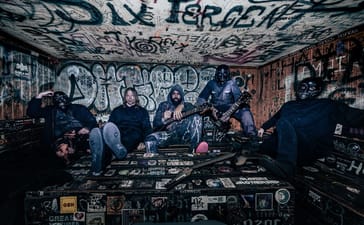Ronnie Radke, frontman of Falling in Reverse, is no stranger to controversy. Over nearly two decades, his legal troubles and erratic public behaviour have become almost as well-known as his music.
With Falling in Reverse now set to tour Australia in March 2025, fans and critics have been left mulling over a serious question. Does attending a Falling in Reverse show simply make you an innocent fan? Or are you ignoring Radke’s turbulent past, and by extension, condoning it?
It goes without saying Falling in Reverse have some great music. Upon releasing their debut album, The Drug in Me Is You in 2011, their music immediately began to attract young, disaffected fans. Often connecting with Radke’s introspective lyrics, he wrote about his struggles in a way that felt both digestible and fresh.
In the years since, Falling in Reverse’s sound has evolved. From referencing pop- punk to tapping into more experimental sounds in recent releases, Radke has a knack for tapping into the zeitgeist. Slowly but surely, they have created a musical legacy staked on experimentation and defying audience expectations.
It also goes without saying, Radke has a checkered past.
Radke’s legal troubles began in 2006 when a fight near a Las Vegas high school turned deadly. Radke, then 22, met Marcel Colquitt to settle a dispute, but both brought backup. In the ensuing melee, Michael Cook, 18, was fatally shot by Chase Rader, a man accompanying Radke. Although Rader later confessed to the shooting, prosecutors ruled it self-defence and dropped charges.
Though, Radke was not entirely let off the hook. He pleaded guilty to battery with substantial bodily harm for his role in the fight and for carrying brass knuckles—illegal in Nevada. His sentence? Five years of probation and a hefty restitution fee to Cook’s family. When Radke violated his probation, he was sent to prison for two and a half years. During this time, Radke was replaced within his band by, Escape the Fate, by Craig Mabbitt.
After his release, Radke formed a new band, Falling in Reverse. This proved, for a time, to be his comeback vehicle.
Though trouble soon reared its ugly head.
In 2012, Radke was arrested for domestic violence, accused of assaulting his then-girlfriend. That same year, during a performance at Six Flags, he threw microphone stands into the crowd, injuring two fans—a teenage girl and a man. Charged with assault, Radke apologised publicly, but the incident led to Six Flags banning hard rock and metal bands altogether.
In 2015, a woman accused Radke of sexual assault after a Falling in Reverse show. While police found no evidence to support the claim, Radke responded by filing a defamation lawsuit against her.
The most recent controversy of Radke’s involves a defamation lawsuit filed in 2024 against music critic Anthony Fantano, adding yet another chapter to an already tumultuous legacy.
Now, as Falling in Reverse prepares to hit Australian stages, fans face a tough question: Is it right to buy a ticket to support a band whose frontman’s past is marred by such severe legal issues and allegations?
Some would argue Radke’s music is an entirely separate entity. That Falling in Reverse has carved out a unique niche in alternative music. Blending metalcore, pop-punk, and rap into a style that resonates with millions. That it is an indisputable fact that the band’s music has helped people feel less alone.
Others argue that supporting Radke’s art means ignoring the harm tied to his name. Buying a ticket, they say, is a tacit endorsement—not just of his music, but of the man himself.
The issue is further complicated by Radke’s tendency to frame himself as a misunderstood figure. His lyrics often explore themes of redemption and growth, but his behaviour hasn’t always aligned with those lofty ideals. Critics point to his legal history as evidence of a lack of accountability, while fans counter that his past doesn’t define who he is today.
There is truly no easy answer to the question of whether you should buy a ticket. Supporting Falling in Reverse is a deeply personal choice, one that forces fans to weigh their love for the music against the moral implications of endorsing Radke’s career.
For some, the band’s upcoming Australian tour is an exciting opportunity to see a group they’ve connected with on a visceral level. For others, it’s a line they refuse to cross.
It goes without saying that music history is also filled with artists with controversial pasts. Does this always stop us from attending their concerts and listening to their music? Sometimes. Some might even argue that these backgrounds inform the music’s greatness.
What’s undeniable is that this tour will reignite conversations about accountability, redemption, and the blurred lines between art and the artist. Whether or not you decide to buy a ticket, it’s worth asking yourself: How much should the person behind the music matter?
There is truly no right answer.










